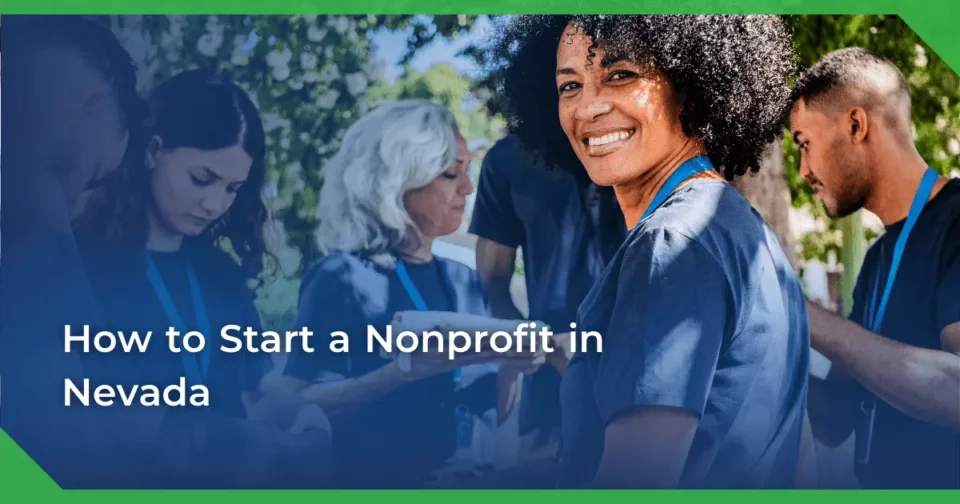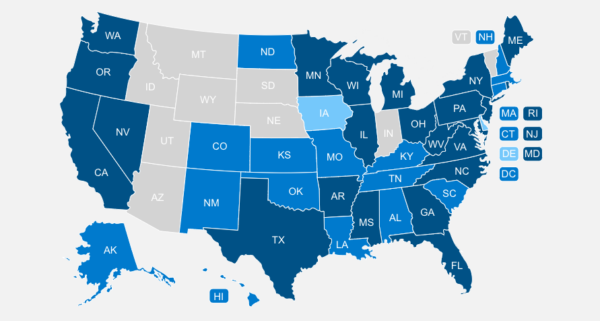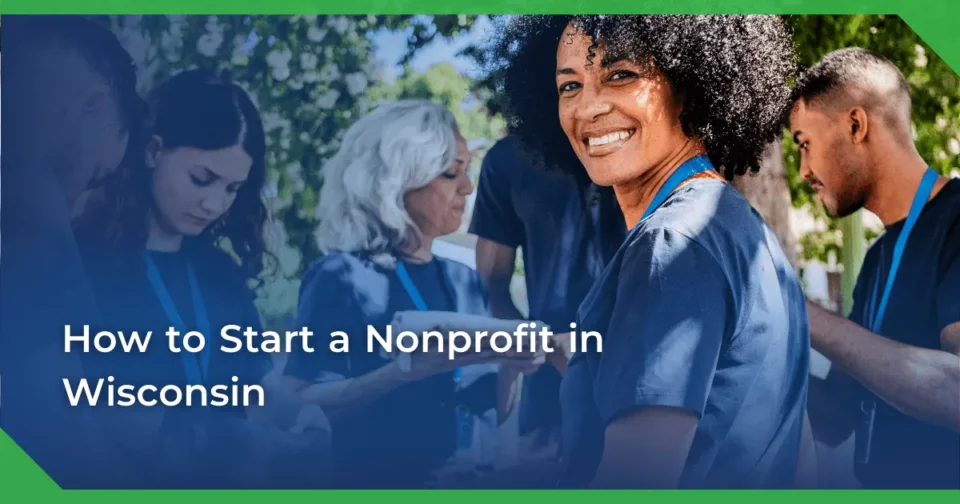
How to Start a Nonprofit in Nebraska: A Beginner’s Step-by-Step Guide
August 26, 2025
How to Start a Nonprofit in New Jersey: A Step-by-Step Guide for First-Time Founders
August 26, 2025How to Start a Nonprofit in Nevada: Step-by-Step Guide for First-Time Founders

Whether you dream of feeding the hungry, supporting the arts, or protecting the environment, learning how to start a nonprofit in Nevada can turn your vision into reality. However, the process involves several crucial steps – from paperwork filing to board formation.
In fact, many aspiring founders feel overwhelmed by the legal requirements and documentation needed. That’s why working with experienced partners like Labyrinth, Inc.’s 501(c) nonprofit services can make your journey smoother and more successful. With over 35 years of experience and a team of Nonprofit Compliance Specialists who each bring 15+ years of nonprofit leadership expertise, we understand the unique challenges you face.
Ready to make your mark on the Silver State? This comprehensive guide will walk you through every step of creating your nonprofit organization in Nevada, from planning your mission to achieving tax-exempt status. Let’s get started!
Planning Your Nevada Nonprofit
Starting a nonprofit in Nevada requires careful planning and strategic decision-making. The foundation of your organization begins with thorough preparation and understanding of the nonprofit landscape.
Define Your Mission and Purpose
Your nonprofit’s mission statement serves as the cornerstone of your organization. This statement should clearly articulate the specific problem your organization aims to address and outline how you plan to make a difference. When crafting your mission, focus on:
- The specific community needs you’ll address
- The target population you’ll serve
- The unique approach your organization will take
Remember to use precise language that aligns with IRS requirements, particularly if you plan to seek 501(c)(3) status. Your mission statement will appear on all legal documents, including your Articles of Incorporation.
Research Similar Organizations
Before launching your nonprofit, conduct thorough research of existing organizations in Nevada. Currently, there are 16,906 nonprofit organizations operating in Nevada, employing 62,319 people and generating more than $13 billion in annual revenue.
The nonprofit landscape in Nevada includes:
- 3,856 foundations
- 1,896 religious organizations
- 1,484 educational institutions
- 1,462 human service organizations
Understanding this ecosystem helps you:
- Identify service gaps in your community
- Find potential collaboration opportunities
- Develop unique programs that don’t duplicate existing services
Additionally, consider connecting with organizations like Labyrinth, Inc.’s 501(c) nonprofit specialists for guidance on positioning your nonprofit effectively within the existing landscape. Our Nonprofit Compliance Specialists can help you navigate this research phase with insights drawn from decades of experience.
Create a Basic Business Plan
A comprehensive business plan acts as your roadmap for success. Your plan should outline:
Financial Projections
- Develop a realistic annual budget
- Create income and expense statements
- Establish balance sheets
- Set up budget status reports
Funding Strategy
Since nonprofits primarily rely on grants, donations, and fundraising activities, your plan should detail:
- Grant application processes
- Donor engagement strategies
- Fundraising event calendars
- Investment policies for federally insured accounts
Administrative Structure
Your plan must address:
- Internal accounting systems
- Record-keeping procedures
- Committee structures
- Professional fundraiser hiring criteria
Program Development
Detail your:
- Service delivery methods
- Program evaluation metrics
- Impact measurement strategies
- Growth projections
Labyrinth’s professional guidance can be invaluable when developing these crucial planning documents. With transparent pricing and no hidden fees, you’ll know exactly what to expect throughout the process. Furthermore, ensure your administrative expenses and promotional costs align with your organization’s financial capabilities.
Remember that directors of Nevada nonprofits must exercise due care in all aspects of organizational planning. This includes maintaining detailed records, forming appropriate committees, and conducting necessary investigations to ensure your nonprofit’s success.
By following these planning steps meticulously, you’ll build a strong foundation for your Nevada nonprofit. This groundwork will prove essential as you move forward with the legal requirements and organizational structure development phases of your journey.
Legal Requirements in Nevada
Nevada’s legal framework establishes specific requirements for nonprofit organizations under Chapter 82 of the Nevada Revised Statutes (NRS) as outlined by the Nevada Attorney General’s office. Understanding these requirements serves as a crucial step toward establishing your nonprofit entity.
Choose Your Nonprofit Structure
The Nevada Revised Statutes recognize several types of nonprofit structures:
- Nonprofit Corporation (NRS 82.006)
- Nonprofit Cooperative Corporation with stock (NRS 81.010)
- Nonprofit Cooperative Corporation without stock (NRS 81.410)
- Corporation Sole (NRS 84.010)
- Cooperative Associations (NRS 81.170)
Most organizations opt for the standard Nonprofit Corporation structure, as it aligns effectively with IRS requirements for tax-exempt status. Through Labyrinth, Inc.’s expert nonprofit guidance, you can receive expert guidance on selecting the most suitable structure for your organization’s goals. Our team provides 1-on-1 support to ensure you understand the implications of each structure type.
Directors of Nevada nonprofit corporations hold significant responsibilities. They must:
- Manage business operations and organizational affairs
- Exercise due care in decision-making
- Supervise officers and govern charitable efforts
- Maintain compliance with state regulations
Moreover, directors face personal liability for intentional misconduct, fraud, or knowing violations of the law under NRS 41.480, as detailed in the Nevada Attorney General’s guide. Therefore, selecting qualified board members becomes paramount.
Select a Unique Name
Choosing a distinctive name represents more than branding—it’s a legal requirement. The Nevada Secretary of State (775-684-5708, nvsos.gov) mandates that your nonprofit’s name must be distinguishable from other registered entities, as outlined in the Nevada Administrative Code (NAC). Consider these essential naming guidelines:
Legal Requirements:
- Names appearing similar to a natural person must include identifiers such as:
- Incorporated
- Inc.
- Limited
- Ltd.
- Company
- Co.
- Corporation
- Corp.
The Secretary of State reviews proposed names based on specific rules outlined in NAC 78.020 to 78.100, as per the Nevada Administrative Code. Labyrinth’s professional assistance can help ensure your name choice meets all requirements while reflecting your mission effectively. With our secure, SOC 2 Type II nonprofit client portal, you can track the name approval process in real-time.
Name Reservation Process:
- Search availability through Nevada’s Business Portal
- Reserved names remain protected for 90 days
- Submit required documentation with the Secretary of State
- Ensure compliance with trademark regulations
Remember that your organization’s name establishes its identity and affects various aspects of operations, from fundraising to community recognition. Therefore, select a name that not only meets legal requirements but also resonates with your mission and stakeholders.
Directors should note that nonprofit corporations must register with the Secretary of State before soliciting tax-deductible charitable contributions. This registration involves submitting a charitable solicitation registration statement (CSRS) alongside the Initial/Annual List of Officers form.
Filing Your Formation Documents
Once you’ve planned your nonprofit’s structure and chosen a name, completing the necessary formation documents marks a crucial milestone in establishing your organization. Let’s explore the essential paperwork and registration requirements.
Prepare Articles of Incorporation
The Articles of Incorporation officially establish your nonprofit under Nevada law. You must file these Articles with the Nevada Secretary of State, then apply to the IRS for federal tax-exempt status. The filing fee for nonprofit articles costs $50, plus an additional $50 for submitting the Initial List of Officers. Standard processing typically takes 7 business days, although expedited options are available:
- 1-day processing: $125 expedite fee
- 2-hour processing: $500 expedite fee
- 1-hour processing: $1,000 expedite fee
For even faster processing, Nevada offers state-specific drop-off service—a unique advantage that Labyrinth, Inc.’s 501(c) nonprofit services provides in all jurisdictions where permitted. This service ensures the quickest possible approval of your formation documents.
Your Articles must include an IRS-approved purpose clause and dissolution clause to qualify for 501(c)(3) status. Essential elements include:
- Organization name and corporate endings
- Registered agent information with Nevada street address
- Names and addresses of initial board members (we recommend at least three directors to align with IRS standards)
- Statement of nonprofit purpose with IRS-compliant language
- Dissolution clause directing assets to other 501(c)(3) organizations
- Incorporator’s signature
- Registered agent acceptance
Labyrinth manages everything—from drafting these documents to ensuring compliance with both state and IRS requirements, giving you confidence that your foundation documents are prepared correctly from the start.
Get an EIN Number
After your nonprofit is legally formed through the Secretary of State, you must obtain an Employer Identification Number (EIN) before opening bank accounts or applying for tax-exempt status. An EIN serves as your nonprofit’s federal tax ID. Although obtaining an EIN is free, this nine-digit identifier remains essential regardless of whether you plan to hire employees, as detailed by the IRS. You can apply through several methods:
Online Application (Preferred Method)
- Available during specific IRS hours
- Instant EIN issuance upon approval
- Must complete in single session
- Print confirmation immediately
Alternative Application Methods
- Fax: 4 business days processing
- Mail: 4-5 weeks processing
- Phone: Available for international applicants
- Third-party designee option available, as described by the IRS.
As part of our comprehensive formation support, Labyrinth includes EIN acquisition in our services. We ensure you obtain your EIN at the optimal time—after your organization is legally formed through the Secretary of State. The IRS presumes legal formation upon EIN issuance, starting the three-year period for maintaining tax-exempt status, according to IRS guidelines.
Register with Nevada Secretary of State
After securing your EIN, complete these essential registrations:
Initial Registration Requirements
- File Initial List of Officers/Directors
- Submit State Business License application
- Complete Common Business Registration form
Charitable Solicitation Requirements
Organizations planning to solicit charitable contributions must file a Charitable Solicitation Registration Statement (CSRS) annually, as per the Nevada Secretary of State’s requirements. This is a separate filing, not granted automatically. Exemptions apply for nonprofits that:
- Solicit fewer than 15 persons annually
- Solicit only to relatives within third degree of consanguinity
- Qualify as churches under IRS 501(c)(3) status, based on Nevada Secretary of State guidelines.
The CSRS must include:
- Corporate name and IRS registration details
- Principal business location
- Executive personnel information
- Fiscal year end date
- Financial information from IRS Form 990
- Officer signature, based on Nevada Secretary of State guidelines.
Throughout this process, maintaining accurate records remains vital. Directors must exercise due care in all filing procedures, as Chapter 82 of the Nevada Revised Statutes governs ongoing operational compliance, as outlined in Chapter 82 of the Nevada Revised Statutes. From charitable solicitation to corporate filings, comprehensive compliance through one partner can simplify your regulatory obligations. Track all your filings and compliance deadlines through our secure client portal, ensuring nothing falls through the cracks.
Building Your Organization
After securing your legal foundation, establishing a strong organizational structure becomes paramount for your Nevada nonprofit’s success. Let’s explore the essential steps to build your organization’s framework.
Form Initial Board of Directors
The board of directors serves as your nonprofit’s governing body. Under Nevada law, your organization must have at least one director who meets these qualifications:
- Minimum age of 18 years
- No residency requirements
- No membership prerequisites, according to the Nevada Attorney General’s guide.
While Nevada allows fewer directors, we recommend selecting at least three unrelated individuals to serve on your board to align with IRS standards. Your organization must appoint:
- A president or board chairperson
- A secretary
- A treasurer
Through Labyrinth, Inc.’s nonprofit compliance specialists, you can receive guidance on selecting qualified board members who understand their fiduciary responsibilities of care, loyalty, and legal compliance. Our Nonprofit Compliance Specialists bring real-world experience from serving in nonprofit leadership roles themselves.
Create Bylaws
Bylaws function as your nonprofit’s internal operating manual. Despite Nevada not requiring state filing, creating comprehensive bylaws remains essential as they must be presented upon request. Your bylaws should outline:
Organizational Structure
- Board size and composition
- Meeting frequency and quorum requirements
- Committee structures
- Leadership roles and responsibilities
Operational Procedures
- Membership program details
- Conflict of interest policies
- Amendment procedures
- Dissolution protocols
Consider seeking Labyrinth’s professional assistance to ensure your bylaws align with both state and federal regulations. Our team handles the entire process—from drafting bylaws that meet IRS requirements to ensuring they complement your Articles of Incorporation. Subsequently, your board must formally adopt these bylaws at its first official meeting.
Set Up Bank Accounts
Opening a dedicated bank account marks a crucial step in establishing financial accountability. To set up your nonprofit’s account, prepare these essential documents:
Required Documentation
- EIN confirmation letter
- Approved Articles of Incorporation
- Board-approved bylaws
- Meeting minutes authorizing account opening
Many banks offer specialized nonprofit accounts featuring:
- Flexible financing options
- Treasury management tools
- Security measures for fraud prevention
- Customized reporting capabilities
First, schedule a meeting with your chosen bank’s nonprofit banking specialist. Next, discuss account options that best suit your organization’s needs, especially concerning:
- Monthly service fees
- Digital banking capabilities
- Branch accessibility
- Integration with accounting software
Remember that directors hold the property received from donors in trust for specific public purposes, as per the Nevada Attorney General’s guide to Non-Profits. Consequently, maintaining separate bank accounts ensures proper financial stewardship and transparency in managing these resources. Your secure client portal with Labyrinth helps maintain all necessary documentation for banking relationships and financial compliance.
Getting Tax Exempt Status
Securing tax-exempt status marks a pivotal milestone in your nonprofit journey. Formation alone does not make donations tax-deductible—you must apply to the IRS for federal tax-exempt status using Form 1023, 1023-EZ, or 1024. This process involves both federal and state-level applications, ultimately enabling your organization to operate tax-free and accept tax-deductible donations.
Apply for 501(c)(3)
The Internal Revenue Service offers two application paths for obtaining 501(c)(3) status:
Form 1023
- Standard application suitable for all organizations
- Filing fee: $600
- Comprehensive documentation spanning 50-100 pages
- Processing time: 3-6 months
Form 1023-EZ
- Streamlined version for qualified small organizations
- Filing fee: $275
- Must complete eligibility worksheet first
- Faster processing time
Through Labyrinth, Inc.’s expert guidance for 501(c)(3) applications, you can receive expert guidance on selecting the appropriate form based on your organization’s size and structure. Our comprehensive support covers both 1023 and 1023-EZ filings, and we handle all IRS correspondence during the application process. Plus, with our 100% money-back guaranteed 501c3 approval, you can proceed with confidence.
The IRS mandates specific requirements for 501(c)(3) status:
- Exclusive operation for exempt purposes
- No private benefit to shareholders
- Limited political activity
- Restricted lobbying involvement
- Proper dissolution clause
IRS review times can span months, and processing varies based on complexity and IRS workload. Upon approval, the IRS issues a determination letter officially recognizing your tax-exempt status. This document proves essential for:
- Accepting tax-deductible donations
- Applying for grants
- Establishing credibility with donors
- Meeting state compliance requirements
For organizations that have lost their tax-exempt status, Labyrinth also provides reinstatement support. The same IRS form (1023) is used for both new applications and reinstating revoked status, and in most cases, submitting an entirely new 1023 form is the best approach.
State Tax Exemptions
After receiving federal recognition, focus on securing Nevada state tax exemptions. Many states require a separate income- or sales-tax exemption application once you have the IRS determination letter. Labyrinth’s professional assistance can streamline this process, ensuring you meet all state-specific requirements while maintaining compliance.
Sales and Use Tax Exemption
To obtain exemption from Nevada sales and use tax:
- Complete Sales/Use Tax Exemption Application
- Submit determination letter copy
- Renew exemption every 5 years
State Filing Requirements
- File Exempt Status Entity Form
- Submit annual reports
- Maintain proper documentation
- Track unrelated business income
The Nevada Department of Taxation (775-684-2000, tax.nv.gov) reviews applications based on these criteria:
- Religious purposes
- Charitable activities
- Educational programs
- Public benefit focus
Once approved, your organization receives a letter of exemption valid for 5 years. The Department sends renewal notifications 90 days before expiration, under Nevada law.
Retailer Requirements
For tax-exempt purchases:
- Present exemption letter copy to retailers
- Ensure retailers maintain documentation
- Use exemption only for qualified purchases
- Keep detailed transaction records
Remember that tax exemption status requires ongoing compliance obligations:
- File Form 990 annually with the IRS
- Submit state annual or biennial reports
- Renew charitable solicitation registrations
- Maintain proper financial records
- Meet filing deadlines
Directors must exercise due care in managing tax compliance, as they face personal liability for intentional misconduct or legal violations, as specified in the Nevada Attorney General’s guide. Accordingly, maintaining accurate records and meeting filing deadlines remains crucial for preserving your organization’s tax-exempt status. With bundled services that include first-year fundraising registration, Labyrinth helps ensure your ongoing compliance from day one.
Conclusion
Starting a nonprofit in Nevada requires careful attention to detail, from defining your mission to securing tax-exempt status. Each step builds upon the previous one, creating a strong foundation for your organization’s success.
Most importantly, remember that “nonprofit” does not equal automatic tax-exempt status. You must file Articles of Incorporation with the state, obtain an EIN, then apply to the IRS for federal tax-exempt status. Proper documentation and compliance remain essential throughout your nonprofit journey. Your organization must maintain accurate records, meet filing deadlines, and follow state regulations to preserve its status and credibility.
Professional guidance from Labyrinth, Inc. can help navigate complex requirements while avoiding common pitfalls. With end-to-end formation support from incorporation through IRS approval and a 100% IRS tax exemption approval guarantee, our expertise ensures your nonprofit meets all legal obligations while focusing on its core mission of serving the community. We combine expert service with modern technology to handle your nonprofit’s registrations and renewals, so you can focus on your mission.
Therefore, take time to review each requirement carefully and seek professional assistance from Labyrinth when needed. With transparent pricing and no hidden fees, you’ll know exactly what to expect at each stage of the process. Your dedication to following proper procedures will help establish a lasting organization that makes a real difference in Nevada.
Above all, remember that successful nonprofits combine passion with proper planning and execution. Armed with this comprehensive guide and the support of experienced Nonprofit Compliance Specialists, you now have the knowledge needed to transform your vision into a thriving nonprofit organization serving the Silver State.


![Your 501(c)(3) Approval Guaranteed{{ include_custom_fonts({"Museo Sans":["Bold","Bold Italic","Regular","Regular Italic"]}) }}](https://no-cache.hubspot.com/cta/default/560178/interactive-194101957210.png)
![Start Your Nonprofit with Confidence{{ include_custom_fonts({"Museo Sans":["Bold","Bold Italic","Regular","Regular Italic"]}) }}](https://no-cache.hubspot.com/cta/default/560178/interactive-194101957151.png)








